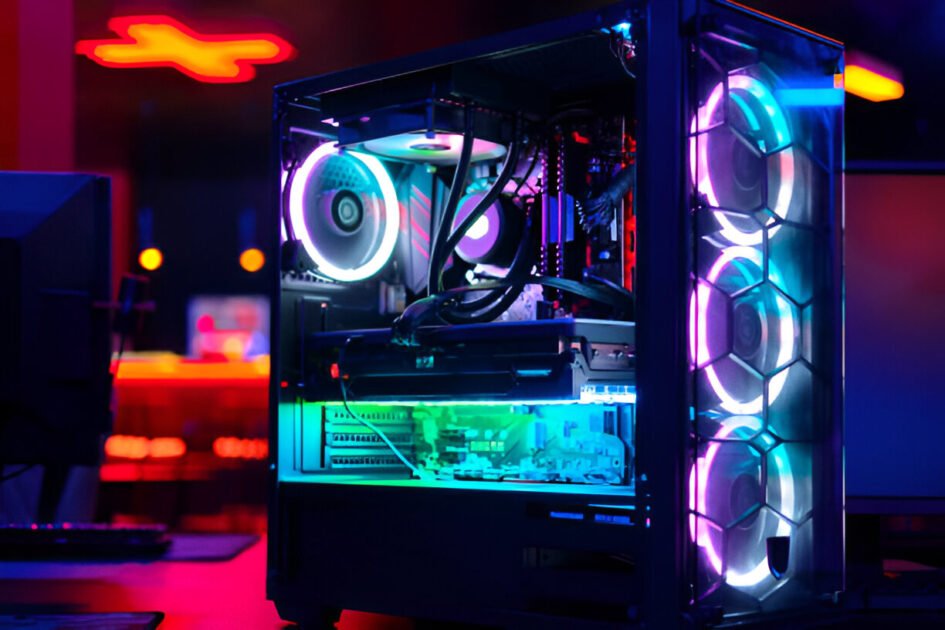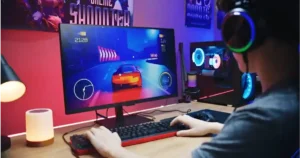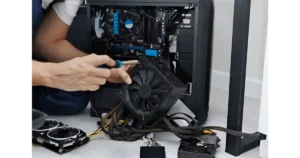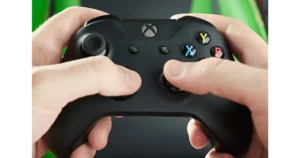If you are a passionate gamer, you must have wondered about the lifespan of a gaming PC and how long it can last. As technology advances rapidly, staying on top of the latest hardware can be like a never-ending race. Let’s find out how to keep your gaming rig alive.
We’ll discuss the factors that can affect the lifespan of your PC. Whether you’re building a new PC or repurposing yours, you need to understand how long your gaming PC can last and how you can upgrade it.
Factors Affecting the Lifespan of a Gaming PC
The lifespan of a gaming PC can be affected by many factors beyond the age of the system itself. From hardware components to usage habits, understanding these factors can help you maximize your PC’s performance and make it last longer.
Hardware Components
Hardware is the heart of any gaming PC. Components like the CPU (Central Processing Unit), GPU (Graphics Processing Unit), RAM (Random Access Memory), and storage play a major role in how long your system can handle critical tasks like gaming.
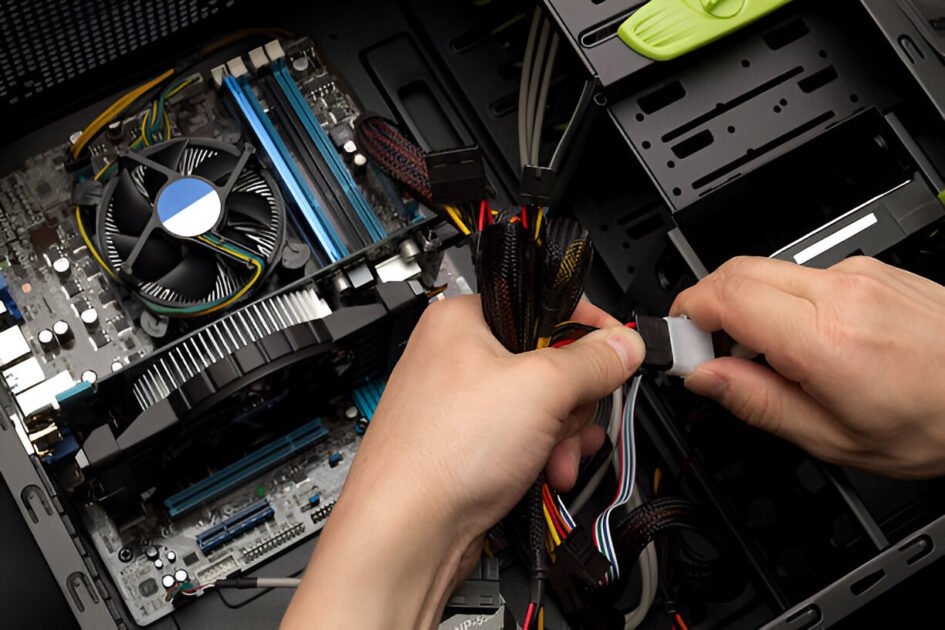
CPU and GPU
These two components are the most important. A powerful CPU and GPU combo can keep your computer running smoothly for many years. As new games demand more from these components, an older CPU or GPU may start to struggle.
RAM
For smooth gameplay, i.e. modern games, 16 GB of RAM is necessary. By the way, upgrading the RAM can increase the life of your PC, but old memory and low-space RAM can cause problems.
Storage
Hard drives (HDDs) last longer but are slower than solid-state drives (SSDs). SSDs offer faster speeds and better performance. Over time, an SSD can wear out, but it usually lasts for several years under normal use.
Upgradability
The biggest advantage of a gaming PC is its upgradeability. Consoles which require a complete replacement after a few years, but a gaming PC allows you to replace individual components.
GPU Upgrades
The GPU is the most important factor in a PC’s gaming capabilities. By upgrading your GPU to a new model every few years, you can keep your system competitive without having to replace everything else.
Other Upgrades
You can also upgrade the CPU, RAM, or storage as needed. Upgrading can increase the overall performance of your computer, as you can refresh its performance with minimal cost in a complete replacement process.
Usage Patterns
How often and how intensely you use your gaming PC can drastically affect its lifespan.
Heavy Usage
If you’re a hardcore gamer who plays resource-intensive titles or engages in multitasking activities like streaming and recording, your components can wear out quickly. Regularly pushing your system to its limits can cause thermal stress, which accelerates aging.
Light Usage
If you use your gaming PC for light tasks, such as browsing, working, or casual gaming, your system is likely to last longer, as the components are not stressed as much.
Maintenance
A well-performing gaming PC can last much longer than a neglected PC at best. Proper maintenance goes beyond just upgrading components and is also about keeping the system clean and running efficiently.
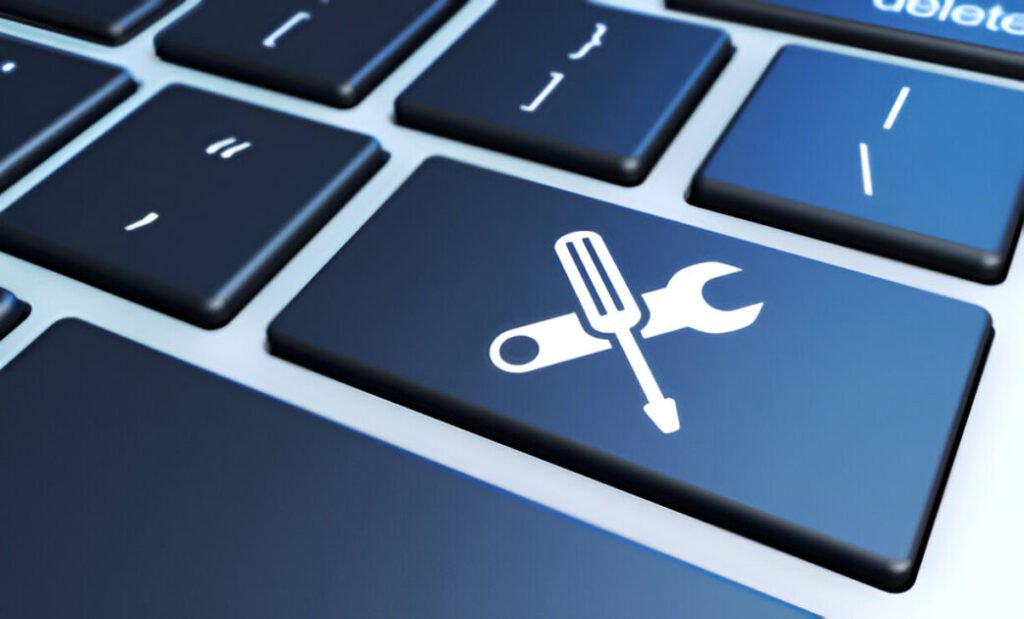
Cooling
Overheating is one of the biggest killers of PC components. Make sure your cooling system is working properly and that there is enough air circulation to prevent internal temperatures from rising too high.
Dusting
Dust buildup can block airflow, causing components to overheat. Cleaning your PC every few months to remove dust from fans, vents, and heat sinks is crucial.
Thermal Paste
Over time, the thermal paste between your CPU/GPU and cooling solutions can dry out and lose its effectiveness. Reapplying thermal paste every few years can help maintain optimal cooling performance.
Typical Lifespan of a Gaming PC
There’s no one-size-fits-all answer when it comes to how long a gaming PC will last. However, on average, a well-maintained gaming PC can last you about 3 to 5 years before it starts to feel outdated in terms of performance. This timeframe can vary based on a number of factors, such as the quality of the components, how much you use the system, and the amount of time you spend on it.
The 3 to 5 Year Rule
Most gaming PCs take 3 to 5 years to reach this point, and this happens when new gaming PCs are putting more demands on your PC or when the CPU and GPU can no longer handle the latest titles at high settings. At this point, your PC may still be fine for casual tasks, but gaming at higher resolutions or demanding settings may result in poor performance.
Lifespan Compared to Consoles
Gaming PCs, unlike consoles, don’t have a lifespan dictated by the release cycle of new hardware. While consoles like the PlayStation or Xbox typically have a lifespan of around 5 to 7 years before a new generation is released, gaming PCs can be upgraded over time. This means that a gaming PC may start to feel dated in terms of raw materials around 3 to 5 years, but with timely upgrades it is possible to keep it running at peak performance.
The Impact of Gaming Trends
Consider where gaming technology is headed. With the increasing popularity of ray tracing, high-resolution gaming (4K), and virtual reality (VR), your PC’s components can quickly start to show their age if they aren’t equipped to handle these advanced features. If your system is already a few years old, these trends may force you to upgrade more frequently to stay competitive.
Signs It’s Time to Upgrade Your Gaming PC
While your gaming PC may last for years, there will come a time when it starts to show signs that it can’t keep up with modern demands. Identifying these warning signs early can save you frustration and help you decide if it’s time to upgrade.
Performance Issues
As your computer ages, you may notice that it struggles with the latest games or tasks that it can easily handle. Here are a few performance-related signs that indicate it might be time to upgrade.
Low Frame Rates
If your games start running at low frame rates (FPS) even when set to low graphical settings, your GPU or CPU may not be up to par with the new titles.
Frequent Stuttering or Lag
Experiencing lag or stuttering during gameplay, even in less demanding games, could point to a failing GPU, insufficient RAM, or overheating issue.
Crashing or Freezing
Unexpected game crashes or regular system freezes are strong signs that your hardware is struggling to keep up.
Incompatibility with New Games
As game developers push the boundaries of graphics and performance, they often increase minimum system requirements. If your gaming PC can’t run new releases at an acceptable performance level, whether it’s because the GPU doesn’t meet the requirements or the CPU is outdated, it might be time to upgrade.
Graphics Settings
If you find yourself playing on low or medium settings when you used to enjoy them on high or ultra, your system is lagging far behind in terms of processing power.
Software Requirements
New games often require updated drivers, new operating systems, or specific hardware features (like ray tracing support) that your PC may not support.
How to Extend the Life of Your Gaming PC
With proper care, your gaming PC can stay in top shape for many years, even if it’s the latest model. Whether you want to maximize your system’s performance or keep it running longer before needing a major upgrade, here are some tips for extending the life of your gaming PC.
Regular Maintenance
Regular maintenance is one of the most important things that can extend the life of your computer. Over time, dust and debris can accumulate inside your system, causing overheating and reduced performance.
Dusting and Cleaning
Clean the inside of your computer every few months. Use compressed air to blow dust off fans, heat sinks, and other components. Avoid touching any parts with your hands to prevent static damage.
Reapplying Thermal Paste
Thermal paste degrades over time, which can lead to higher temperatures for your CPU and GPU. Reapply fresh thermal paste every few years to maintain optimal cooling and prevent overheating.
Manage System Resources
Overclocking is a great way to get more performance out of your components, but it’s important not to push your system too far. Overclocking increases the power and heat dissipation of components, which can cause them to wear out more quickly.
Balance Performance and Stability
If you overclock, monitor temperatures and performance closely to avoid pushing your system beyond its capabilities. For most users, keeping things at stock speeds offers a good balance of performance and longevity.
Use Software Tools
Tools like MSI Afterburner or CPU-Z can help monitor temperatures and clock speeds. You can adjust the settings if you notice excessive heat or instability.
Optimize Your Software
Maintaining your software is just as important as hardware maintenance when it comes to maximizing your computer’s performance.
Update Drivers Regularly
Make sure your GPU, CPU, and other hardware drivers are always up to date. Manufacturers release driver updates to improve performance, fix bugs, and increase compatibility with new games.
Keep Your OS Clean
Perform regular disk cleanups, delete unnecessary files, and optimize your system by disabling startup programs that aren’t needed. This will help free up resources and ensure your PC runs smoothly.
Monitor System Health
Use software like CCleaner or HWMonitor to track your system’s health and performance over time. These tools can help you spot issues before they become major problems.
Conclusion
While a gaming PC typically lasts 3 to 5 years, its lifespan is largely determined by how well it’s maintained, the quality of its components, and how often it’s upgraded. With proper maintenance, such as regular cleaning, cooling, and mindful use, you can extend the life of your system beyond its expected lifespan. Upgrading key components like the GPU or adding more RAM when needed can keep your PC running smoothly, ensuring you stay competitive with new games. However, when performance slows or your system can’t keep up with the latest gaming demands, it’s a sign that an upgrade or even a complete rebuild may be in order.
